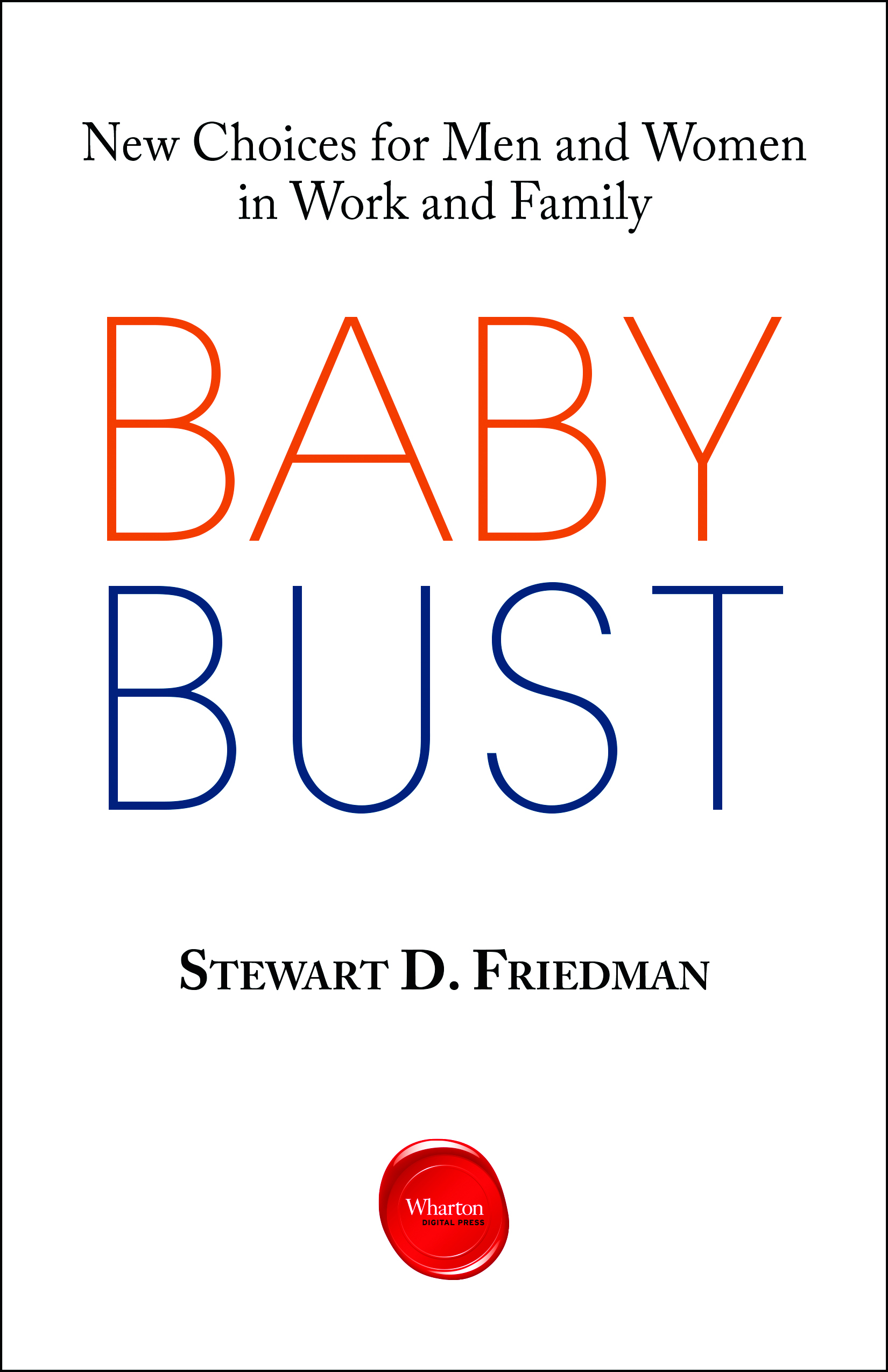Contributor: Alice Liu
About Baby Bust: New Choices for Men and Women in Work and Family
Stew Friedman, director of The Wharton School’s Work/Life Integration Project, studied two  generations of Wharton undergraduate students as they graduated: Gen Xers in 1992 and Millennials in 2012. The cross-generational study produced a stark discovery – the rate of graduates who plan to have children has decreased by nearly half over the past 20 years. Men and women have become more aligned in their attitudes about dual-career relationships, and, while their reasons for opting out of parenthood are quite different, they are doing so in equal proportions. In his new book, Baby Bust: New Choices for Men and Women in Work and Family, Friedman draws on this unique research to explain why so many young people are no longer certain they’ll become parents. He reveals good news and bad news: there is greater freedom of choice now, but new constraints are limiting people’s options.
generations of Wharton undergraduate students as they graduated: Gen Xers in 1992 and Millennials in 2012. The cross-generational study produced a stark discovery – the rate of graduates who plan to have children has decreased by nearly half over the past 20 years. Men and women have become more aligned in their attitudes about dual-career relationships, and, while their reasons for opting out of parenthood are quite different, they are doing so in equal proportions. In his new book, Baby Bust: New Choices for Men and Women in Work and Family, Friedman draws on this unique research to explain why so many young people are no longer certain they’ll become parents. He reveals good news and bad news: there is greater freedom of choice now, but new constraints are limiting people’s options.
Student Reactions to Baby Bust
At the Baby Bust: New Choices for Men and Women discussion events on November 5, 2013 and January 17, 2014, Wharton undergraduate and MBA students explored the compelling findings of the study and the actions that might emerge to help Millennials achieve greater harmony and less conflict in work and life across all stages of their lives and careers.
After approximately fifteen minutes of small group discussions, students reconvened to share the findings that surprised and affected them the most. All students were shocked by the overarching finding that only 42% of 2012 graduates definitely plan to have or adopt children, compared to the 78% of graduates who indicated the same in 1992. However, students also articulated a variety of specific insights and concerns about how the definition of family is changing. Kashfia Ehsan (W ’16) was surprised that Wharton graduates who, by and large, had benefitted from robust parental care and support are choosing not to give back by becoming parents themselves. On the other hand, Federico Velarde (W ’14) and Katie Simon (W ’14) noted that while our personal upbringings affect what we believe is possible in our own futures, there are many structural challenges that create conflict between what we desire and the reality of what is possible. As an alternative to parenting, Briana Thompson (W ’15) resonated with the finding that Millennials are choosing to structure their “families” around their friends rather than starting to form their own nuclear families at the outset of their careers. However, despite the benefits of having a tight-knit “family” of friends in our twenties, Arjan Singh (W ’16) expressed concern that we are redefining family to the point where children won’t be part of the equation anymore. Thus, while students saw reflections of themselves in the results from the 2012 graduates, they were also disconcerted by how much the definition of family has shifted away from having children in the past 20 years.
After discussing the findings, students shared new actions and choices that might emerge after reading Baby Bust. Many students said they feel that their energy and attention is devoted to academics and job-searching and that they neglect the other parts of their lives – family, community, and self. One suggestion was to encourage the practice of trying to consciously and deliberately integrate work and other parts of life starting at the undergraduate level by establishing small goals, such as finding a new café in another part of the city in which to study or going out to lunch with a new friend. Stew Friedman added that these ideas aligned with the concept of “small wins” outlined in his Total Leadership: Be a Better Leader, Have a Richer Life curriculum, which focuses on integrating work with family, community, and self.
Morgan Motzel (W ’15) noted that the most important new action that she plans to take is to encourage her peers “to be enthusiastic about pursuing a wider range of career paths and lifestyles than those typically chosen by Wharton undergraduates.” In his article, “Why Do Harvard Kids Head to Wall Street?” James Kwak, Associate Professor at the University of Connecticut School of Law, argues that the reason so many elite university graduates head to typical career paths like consulting or investment banking is because these firms make the recruiting process straightforward and guarantee future opportunities. To combat the difficulties of reconciling these challenging career paths with other life priorities, many students inthe discussions believed that expanding the dominant mindset from consulting and finance to include work in the social impact and public sectors might be a beneficial adjustment. Hanna Seminario (W’ 16) noted that in order to pursue a more individualized path, she planned to utilize the Penn Alumni Network to learn more about positions in non-typical fields. More generally, Morgan suggested that undergraduates should broaden their imaginations and considerations when making early career choices in order to explore a wider range of possibilities to be in a better position to integrate work and life throughout the duration of their careers.
At the end of the November 5, 2013 discussion, Stew Friedman asked, “How do we get men to care?” Arjan, one of two men in a room of fifteen students, posited that the nature of “manliness” is changing. He believes that in order to engage more men in the discussion, we need to not only redefine family, but also redefine manliness. Visit the Forum next week for a guest post from Arjan about the role of men in the work/life integration conversation.
If you are interested in joining the discussion about challenges and choices in pursuing greater harmony between ones values and ones choices in work, family, and the rest of life, “like” the Wharton Work / Life Integration Project on Facebook and subscribe to the Forum.
About the Author
 Alice Liu is an undergraduate senior studying Management at The Wharton School and English (Creative Writing) at the College of Arts & Sciences.
Alice Liu is an undergraduate senior studying Management at The Wharton School and English (Creative Writing) at the College of Arts & Sciences.